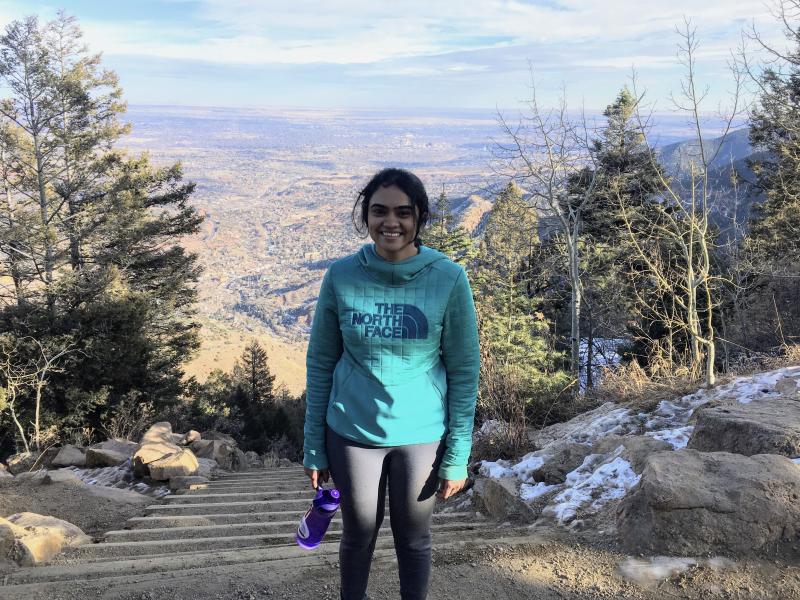Graduating Korbel Student Set to Continue Gender and Conflict Studies in PhD Program

“The ultimate plan is to do research that is socially important — that is relevant to people who are living under oppression,” Sinduja Raja says.
Sinduja pursues that goal at the Josef Korbel School of International Studies and is set to graduate with her master’s degree this month. She came to the University of Denver from her native India to take part in a fellowship program at the Sié Chéo-Kang Center for International Security and Diplomacy, where she was part of the first all-women cohort.
In addition to providing a strong community of likeminded students, the Sié fellowship introduced Sinduja to a number of scholars in the field, including assistant professor Marie Berry. The two first connected in Berry’s Gender, Security and Human Rights course, but the conversation continued long after final papers and exams were evaluated.
“Professors here are really open to just meeting and pitching ideas and talking about your research,” Sinduja says. “I did that with Dr. Berry, and in my second year I started working as her research assistant. That’s when I started working with the Inclusive Global Leadership Initiative (IGLI).”
Based out of the Sié Center, IGLI combines research, education and programming that highlights the role of women and underrepresented groups in peaceful movements around the globe. The initiative’s renowned summer institute provides fellowship and advanced training to the world’s leading women activists.
Leading up to the 2019 summer institute, Sinduja helped develop a curriculum that would engage women activists across different contexts. She then had the opportunity to work with participants once they arrived on campus. Sitting in on the many workshops and conversations, Sinduja found renewed interest in conflict and specifically the way gender operates in conflict.
“It’s not just another project,” Sinduja says. “IGLI has such a profound, immersive, life-changing atmosphere. There’s no way I could explain. After getting involved in IGLI, lots of things started to fall into place for me about how I see my own path.”
For Sinduja, the next step means continuing her studies in the Korbel School’s PhD program, where she plans to further her work with IGLI and Berry and advance her own research exploring the gendered aspects of the conflict in Kashmir, a majority-Muslim region contested by Pakistan and India. She hopes to publish an article on her findings before the end of the year.
Determined to fulfill her goal of engaging in socially important work, Sinduja is considering teaching, additional research and a return to India to empower others with the knowledge she’s gained.
“My goal is to actually go back and be the mentor that I would have needed,” she says, “or that people far less privileged than me would have needed in India to sort of help them chart the route they want to take with their lives.”
Berry, for one, is glad to have Sinduja on campus for the next several years.
“Working with Sinduja is a privilege I find myself constantly grateful for. She pushes me, my politics and my commitments to make me consider new challenges and silences that I might have missed,” Berry says. “I believe Sinduja is the kind of student the field of international studies needs: brilliant, expansive in her thinking, and focused on parts of the world that too often go unexplored. I am so confident that Sinduja is going to make an exceptional scholar whose work will contribute impressively to the field in her career.”


